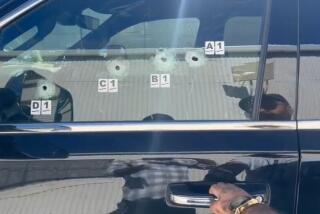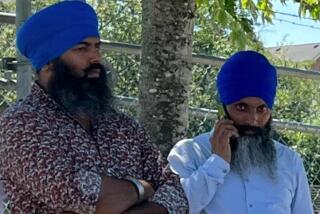Collateral Damage in War on Terrorism
- Share via
MESA, Ariz. — Balbir Singh Sodhi was a businessman, not a terrorist. He was Indian, not Arab. He was a Sikh, not a Muslim. But his dark skin and the turban he wore to cover his flowing black hair made him uneasy in the days after the terrorist attacks.
He told customers at his Chevron gas station that he had gotten at least two threats. For days, he scoured stores, unsuccessfully trying to buy a U.S. flag that he could fly outside his business--a symbol to show his love for America.
Today, Sodhi will be cremated and his ashes will be flown back to his native India. The 49-year-old was killed outside his business last Saturday, the victim, police say, of an angry man who was becoming ever more enraged.
Sodhi was the first to die in a nationwide series of attacks against Arab-looking people since hijackers linked to Osama bin Laden’s terrorist network slammed planes into the World Trade Center and the Pentagon.
To his family, Sodhi is as much a victim as those who died in the air crashes. He represents, in a sense, collateral damage in America’s new war on terrorism.
“He was killed because of his turban,” Sodhi’s brother, Harjit, said. “It is what people see on TV. They are confused.”
Sodhi was checking on the new landscaping in front his business when he was killed. Police said Frank Roque, a 42-year-old Mesa machinist, opened fire with a .38-caliber handgun as he drove past in his pickup truck.
Roque drove to a Mobil station a few miles away and allegedly fired at a Lebanese American clerk. He missed. Then it was on to a home Roque once owned, where he blazed away again, this time barely missing an Afghan man who was coming out the front door, according to authorities.
Two hours later, Roque was arrested at his home. As he was led away, he shouted: “I stand for America all the way!”
The killing of Sodhi--a gentle and generous man who lived for his faith, family and 12-hour workdays--has roiled the Sikh community.
Central Arizona is home to more than 2,000 devotees of the 500-year-old religion that espouses peace and tolerance. Some have been here for more than 30 years, finding in this largely white, conservative region a safe and prosperous life. Now, many have pulled their children out of school.
“We’re supposed to be as strong as steel, as steady as stone. That’s our motto,” said Gurukirn Kaur Khalsa, a minister and president of Arizona’s largest and oldest Sikh temple. “For all of us, this is a test of our courage.”
The killing has also rocked the larger Mesa community. Here, on the leading edge of Phoenix’s suburban sprawl, people are grappling with Sodhi’s death with a mixture of sympathy, anger and shame.
“What this guy who fired the shots did makes me embarrassed and ashamed to be a white man,” said Guy Crawford, a heavy-equipment operator. Sodhi “treated everyone so well, he greeted us all, he made us all feel good. . . . Then some white guy goes and shoots him just because of the color of his skin. Disgusting.”
Family Migrated From India to Escape Violence
Sodhi’s younger brother, Harjit, 40, was the first of four brothers to leave their family farm in the northern Punjab province of India to come to the United States. They sought to escape violence against Sikhs who were seeking an independent state.
“I wanted to save my children. I wanted to save my wife, save my family,” Harjit Sodhi said. “I sat back, and thought: ‘Where can I go? Where can I send my family?’ The U.S., I thought, was the best, the most wonderful country. We will be safe there.”
One by one, his brothers took the same path, settling first in Los Angeles, working at convenience stores, holding down two jobs at a time. One by one they learned English, saved their money and moved on to start businesses.
Balbir Sodhi, the eldest son, arrived in 1988 and became the family’s patriarch in the United States, the man the other brothers consulted for advice.
Sodhi invested his savings in opening a tiny fabric store in downtown Los Angeles. Within months, it failed.
Sodhi’s brothers had set down roots in the Phoenix area. Harjit had an Indian restaurant. Lakhwinder ran a gas station. Jaswinder opened an air-conditioning company, naming it American Air Standard.
“America is my country,” Jaswinder said, explaining his choice.
The brothers pitched in, bought land and built a second gas station and convenience store in the desert, out where all the new homes were going up.
“You’ve never seen a gas station that beautiful,” Harjit said proudly.
Balbir Sodhi moved into a house across the street, along with two fellow Indians hired to help him run the place.
Sodhi quickly became a beloved figure in the neighborhood of working-class whites. People flocked to the new establishment--partly because they enjoyed bantering with the easygoing Sodhi, but also because there are few convenience stores in the area of modest, low-slung homes.
When the local youngsters used the parking lot as a skateboard park, Sodhi didn’t run them off. If anything, he encouraged them.
“I warned him about liability,” Harjit said. “He would say, ‘Do you have faith in God? God is not going to do something wrong to these kids.’
“He was always so nice. He was always giving candies free to the children who came in. One time I told him, ‘You know who pays for those candies? You know we don’t get them for free?’ ”
Balbir pulled out his wallet and handed his brother--his business partner--a $10 bill to cover the cost. And he told Harjit, “These are my kids. I love them.”
Harjit shakes his head at the memory.
“I feel myself shame,” he said.
Tribute: ‘I Hope I Can Be as American as You’
Within hours of the killing, people from the neighborhood--some of whom had warned Sodhi to be careful in recent days--began bringing flowers and candles to the gas station. A street-corner memorial sprang up overnight.
A week later, the candles have turned to rivers of wax under Arizona’s blazing sun. The flowers have wilted. But the inscriptions left on cards and poster boards still resonate.
“Don’t feel alone. We are all Sikh,” said one.
“I have lived here all my life. I hope I can be as American as you,” read another.
A woman named Sherry wrote: “I stopped every day for the last five months to get my cigarettes. I am very saddened.”
In the days before he was killed, Sodhi consulted religious leaders at his temple and told them it would be a good idea to contact the media, ask for stories to be done explaining who the Sikhs are, and what they are not.
Two days before Sodhi died, one regular customer noticed that he came to work without his turban, the first time she had seen him without it.
“He said he did it out of respect, as a sign he was in mourning for what happened to this country,” said the woman, fighting back tears.
Roque didn’t like what had happened to his country either. Shortly after the shooting rampage, he burst into Papillion’s Too, a Mesa sports bar, and was pounding his fists on the bar.
“He was shouting, ‘We’re going to take back our country from the Arabs! We need to stand up and fight!’ ” said Dan McLellan, the bar’s manager. Then Roque added, “They’re investigating the murder of a turban head down the street.”
The bartender wouldn’t serve Roque, and tried to ease him out, then called the police.
Little is known about Roque, who moved back to Mesa from Alabama last year and worked at a nearby Boeing facility. Authorities aren’t talking as they continue to investigate the case.
Local media have reported that his wife, Dawn, obtained court orders of protection against him at least twice in recent years after he punched her, put a gun to her head and roughed up their children.
The mobile home park where Roque lived is less than three miles from Sodhi’s Chevron station. The complex is hard and dusty, a ramshackle collection of sun-bleached trailers with cars parked on lawns that have given way to weeds.
“This place is made up of old folks, dirt balls and poor white trash,” said J.H. Woods, who is 64 and has lived here 23 years. “I wouldn’t call this Beverly Hills.”
At Roque’s trailer, a block from Iran Avenue, a shirtless man in his 20s sporting a nipple ring answered the door. He said his name was Douglas Williams, that he is Roque’s friend, and, no, the family doesn’t want to talk.
“He’s a good guy,” Williams said of Roque. “He just had a really bad night and it led to something. There was stress from work, stress from everything that’s going on around the world.
“His family loves him a lot and wishes he was back home. They’re sorry about what happened to this man who died. In Frank’s own heart, I’m sure he is sorry too.”
Victim’s Family Urges Forgiveness
Sodhi’s family is sorry. Sorry, saddened, apprehensive of what might come next--but not angry.
In the Sikh religion, a life not lived well will be repeated through reincarnation. “We’re not thinking bad for him,” Harjit Sodhi said of his brother’s killer. “We just pray to God that in his future life that he not do this thing to other people.”
Life has many paths, but in the Sikh religion, anger and hatred are not among them.
“I can’t really be mad. He wouldn’t have been mad either,” said Khalsa, Sodhi’s minister. “He would have forgiven him for what he did. And then he probably would’ve reached into his pocket and given him some candy.”
Times staff writer Kurt Streeter contributed to this story.
More to Read
Sign up for Essential California
The most important California stories and recommendations in your inbox every morning.
You may occasionally receive promotional content from the Los Angeles Times.










